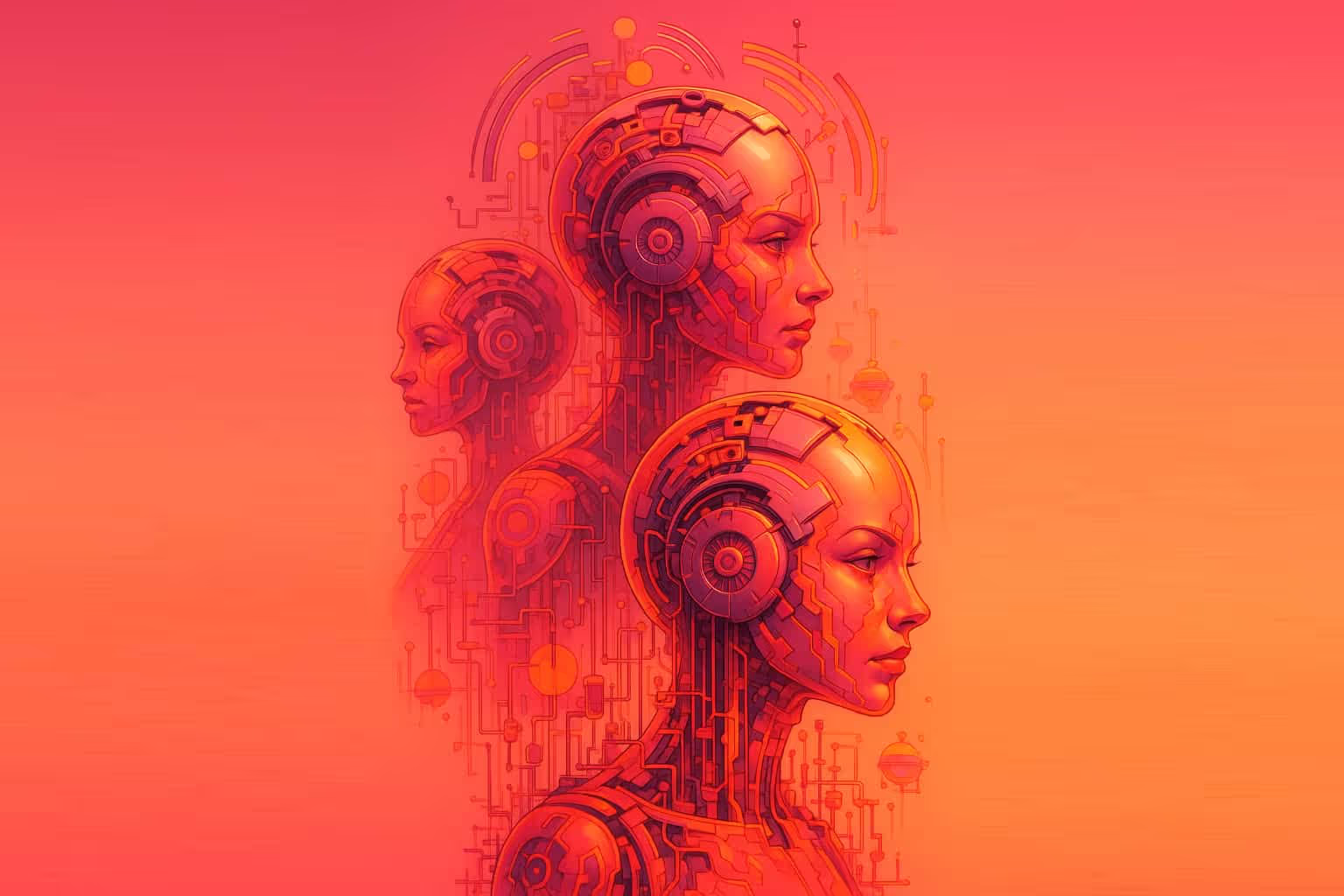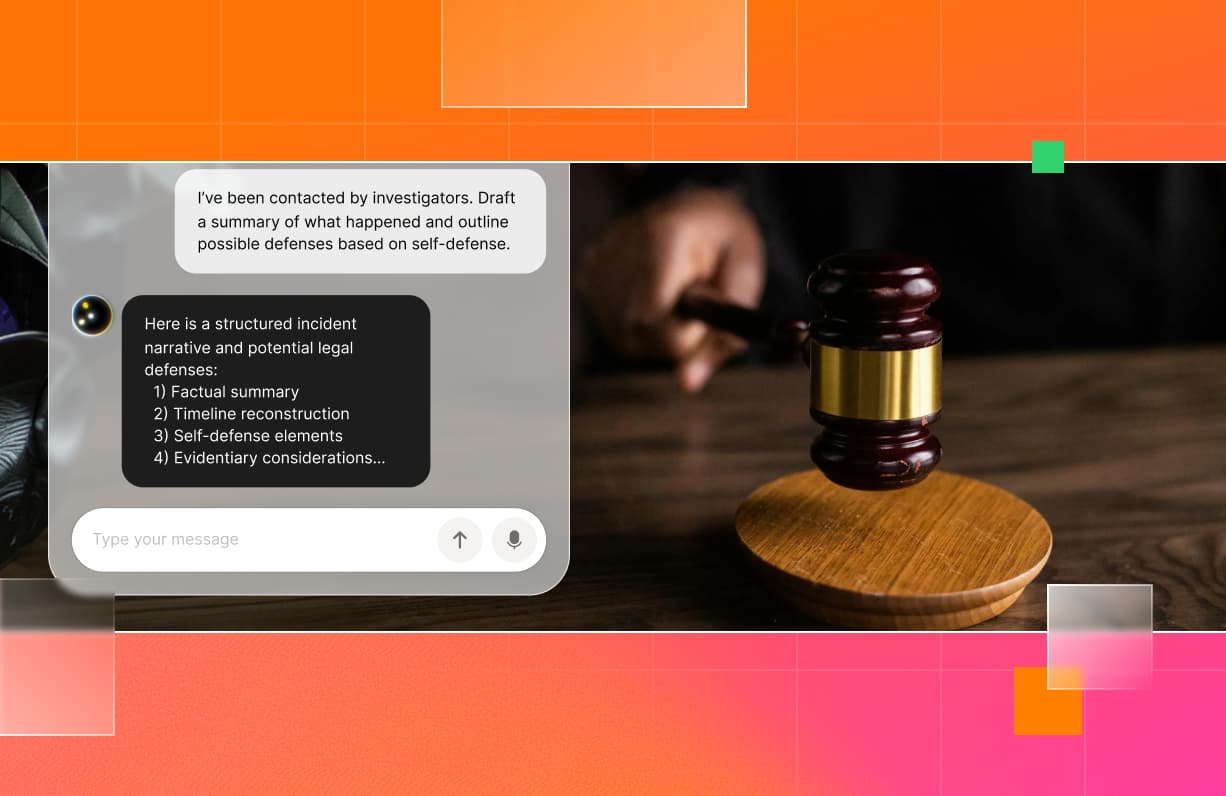How Autonomous AI Agents Are Transforming Businesses in 2025


Do you want an AI teammate that assists you in your tasks and takes the lead on making decisions and working on them, exactly like a human co-worker? With self-driving cars bustling across streets and AI assistants managing our daily schedules, this is no longer a futuristic dream.
Gone are the days of traditional AI software and technologies that could just respond to your queries. Today, we have sophisticated, ubiquitous, and more intelligent systems that can work on our behalf exactly like us. These systems are autonomous decision-making AI agents in action.
But what exactly are autonomous AI agents? How do they differ from AI agents? What benefits do they have for businesses? Let's discuss all of this together in this blog.
What Are Autonomous Decision AI Agents? How Do They Work?
As the name suggests, autonomous decision AI agents are sophisticated and advanced AI agents that act and operate independently without any human intervention. When given a particular task, these AI agents perceive and analyse the environment and goals based on which they take and execute decisions independently.
They are mainly goal-driven complex systems that go beyond the pre-defined rules to dynamically sense and adapt to their environment. They understand the goal and design and redesign the workflow to achieve it with complete automation.
Autonomous decision-making AI agents are known for their ability to function independently. Besides this, they also have social skills and abilities that help them collaborate with other agents and humans to accomplish even more complex tasks. Virtual assistants such as Alexa, Siri, and Google Assistant, and autonomous vehicles such as cars and drones are perfect examples of these AI agents in action.
But, how do these autonomous decision AI agents work independently? Their basic architecture includes three key models, which are listed below.
1. Perception Module: With this module, the agent first collects data and information from various sources by sensing the environment. This data helps the agent understand the context and nature of the assigned task, thus improving its decision-making.
2. Decision-Making Module: The agent then analyses the data and uses machine learning and other decision-making algorithms to evaluate the possible actions and outcomes. Ultimately, it decides on the best course of action.
3. Action Module: Once the decision is made, the AI agent executes it for the desired outcomes. This action may be in any form: physical actions, performing tasks, or responding with replies.
One of the most striking features in the architecture and working of these autonomous decision AI agents is their reinforcement learning and adaptation. They continuously learn and fine-tune from their learning base and feedback. This helps them improve their positive outcomes and overall performance with time.
How Do Autonomous AI Agents Differ From AI Agents and Chatbots?
The following discussion must have struck your mind with how these autonomous decision AI agents differ from other AI technologies. Well, let's discuss that first before moving ahead.
Autonomous decision AI agents are much more advanced than traditional AI technologies like chatbots. These agents are much more complex than chatbots, which rely solely on pre-programmed scripts, logic, keyword matching, and other such pattern recognition mechanisms.
They can understand context and cues and have the memory to remember the interactions, too. Nevertheless, they can analyze, reason, and multitask with autonomy.
Chatbots can't learn from previous conversations and improve themselves, while these AI agents excel.
Chatbots are mostly static and struggle with multi-faceted, open-ended, and complex user requests. On the other hand, autonomous decision AI agents can easily break down these tasks, list and prioritise them, giving you the desired goal.
Now, how do autonomous decision AI agents differ from AI agents and agentic AI? AI agents and autonomous decision-making AI agents are designed to complete defined tasks, but the latter have significantly more autonomy than the former. While AI agents are assistive, like co-pilots, autonomous AI agents are more like pilots who can independently chart and execute decisions.
Moreover, unlike autonomous decision-making, AI agents require human oversight and intervention; thus, while all autonomous decision-making AI agents are AI agents at their technical core with added autonomy, not all AI agents are autonomous.
Similarly, many confuse “agentic AI” and “autonomous AI” and use these terms interchangeably. However, there are slight differences between these two, too. While agentic AI focuses on goal-oriented behaviour within a restricted environment, autonomous AI is broader and open-ended without pre-defined programming and rules.
Here's a simple, summarised table to help understand the underlying differences better.
Types of Autonomous AI Agents
Are you business owners or managers looking to maximize your automation efforts with autonomous decision AI agents? Let's first understand their three types, based on the level of complexity & autonomy they have.
1. Reactive Agents
These simple-to-design autonomous agents are based on stimulus-response working, which responds to the environment immediately. They're the simplest autonomous agents that make decisions only based on new data.
They provide quick and fast responses but have no internal memory or history. Thus, they cannot handle many complex tasks that require long-term planning and foresight—for example, automated doors open automatically when motion is detected around them.
2. Deliberative Agents
Also known as model-based or planning agents, these autonomous agents model the external environment and make the best decisions by weighing their outcomes. They are known for their reasoning abilities and capacity to “think ahead”.
They strategically plan decisions with a structured environment model, considering their long-term consequences. They are ideal for handling complex and multi-step tasks. For example, Personal digital assistants analyse your schedule and schedule tasks based on your preferences and time constraints.
3. Hybrid Agents
As simple as it sounds, these autonomous agents have a reactive layer for immediate responses and a deliberative layer for structured and strategic responses. They are complex to design, balanced, adaptable, and excel in efficient resource allocation.
For example, advanced robotics systems must react to environmental changes and plan complex tasks.
Business Use Cases of Autonomous Decision AI Agents
Did you know that the global market value of autonomous AI & such agents is between $6.8 billion and $9.93 billion, as of 2025? Furthermore, it's expected to hit $44.76 billion by 2029 and $103.28 billion by 2034. The growth rate of this market indicates its rising adoption and use across multiple industries. But, how exactly are businesses using it?
Finance industries use them to automate fraud detection, financial reporting, and analysis. Similarly, human resources teams are implementing these agents to shortlist profile candidates, schedule and take interviews, and guide them through onboarding.
In defense and security, these systems are used in drones and surveillance robots to automate patrolling activities. In agriculture, they can be used to monitor crop conditions and manage irrigation to maximize crop yield. They can also be used to check and monitor pollution levels, factors that lead to their increase, and wildlife movements.
But what are some everyday use cases of these autonomous AI agents? Let's explore it together.
1. Sales
The sales team can use these autonomous decision AI agents for intelligent lead qualification, follow-up, and engagement content purposes. When connected to the CRM and marketing platforms, they can analyze the incoming leads based on their activity, demographics, engagement, etc, and score them. These scores will allow the team to prioritise and focus accordingly.
They can also send personalized follow-up and engagement conversations to leads in other stages of the funnel and nurture them to convert. From answering customer queries to analysing customer data to provide valuable insights on improving your marketing efforts, they can assist the sales team in understanding the leads and nurturing them.
2. Marketing
About 65% of customers expect personalized interactions that target their changing needs and preferences. Do you want an AI agent that understands your customers and personalizes the content and campaigns that reach them? Autonomous AI agents can go beyond this to automate, manage, and optimize your campaigns end-to-end.
They can assist you in creating, scheduling, and distributing posts targeted at specific audience groups. Nevertheless, they can also handle your digital marketing campaigns across multiple platforms, including social media, providing real-time data, analysis, and suggestions to maximise ROI and conversion rates.
3. Customer Service
Chatbots were initially introduced to automate customer service. Like them, autonomous AI agents also excel in this, but in better ways than they do. They guide users to resolve even complex queries proactively. They can also handle tons of queries simultaneously and efficiently.
Besides, they can also handle and analyse customer data and continuously check and review server performance to detect anomalies. Sometimes, they even fix these issues themselves and automatically notify the technical team if the problem escalates or worsens.
4. Supply Chain and Logistics
Much like human workers, autonomous decision-making AI agents can monitor equipment performance via sensors attached to them. They also analyze it to predict and schedule maintenance. This helps supply chain managers minimise unplanned downtime.
Furthermore, they also provide insights on inventory with intelligent demand forecasting. They provide real-time insights on the available inventory, preventing stockouts and reducing storage costs.
5. IT Teams
If autonomous AI agents are so good at predicting and detecting anomalies and taking actions against them, wouldn't security agents powered by them be powerful? The good thing is that they are! They continuously monitor cyber activities, network traffic, and system logs to detect any suspicious activity or threat.
Upon detecting any such threat, they automatically trigger maintenance tasks and alerts against it. From automated maintenance to mitigating these threats, they can handle everything.
Benefits of Autonomous Decision AI Agents
Autonomous AI agents are intelligent communicators who can adapt to dynamic environments and make the most suitable decisions based on them. Here is a list of benefits these agents offer to businesses.
1. These agents provide managers with a more comprehensive, qualitative, and quantitative view of their operations with in-depth analysis, insights, and holistic, better-informed decisions.
2. They automate many tasks and work on them 24/7 without getting tired or needing any breaks. This not only optimises resource allocation but also contributes to cost savings.
3. While automating the tasks, they perform these tasks with improved productivity and efficiency.
4. When multiple such agents work together, their swarm intelligence makes them more flexible, adaptable, and robust, enabling them to complete complex tasks easily.
5. When deployed in a high-stakes environment, they can easily handle and automate hazardous tasks that would have otherwise put the lives of human workers at risk.
6. They are versatile, responsive, and scalable, and can be used in many ways across multiple domains and industries. Scaling with them won't cost a chunk increase in resources.
Challenges and Risks Associated With Autonomous Decision AI Agents
Surprisingly, these autonomous decision-making AI agents make our lives better by automating tasks involving decision-making processes, too. Sometimes, their strategic decisions backed by tons of analysis may fail human choices, too. However, unlike every technological invention, some risks are associated with them.
1. The most common risks involve security and data breaches. They are also not safe from hackers and may spill confidential data too.
2. Their reasoning and decision transparency are still questionable, and users may not always trust the efficacy of their outputs.
3. While making decisions, the lack of human involvement and oversight makes things worse. If the agent starts hallucinating or is trained with some biased data, its choices may have unforeseen consequences.
4. With all that being said, the accountability for their mistakes also puts businesses at legal risk.
5. Mostly, these agents lack high emotional intelligence. Thus, their strategic decisions may not always be applicable, making them incapable of handling complex interpersonal interactions.
Besides, some challenges are involved in developing these technically complex autonomous agents. Let's discuss them.
1. Developing these agents requires vast amounts of diverse training data. Sourcing such data is difficult with the questionable readability of available external data sources.
2. The lack of standardization will make these agents inconsistent and incompatible with making wise, informed decisions.
3. Developing and training them also demands resources and computational energy, which are costly.
4. Developing autonomous decision-making AI agents demands significant investment in advanced R&D, robust infrastructure, and specialized talent.
5. Furthermore, these systems require continuous optimization through updates, retraining, and vigilant monitoring to maintain performance and reliability.
What Does The Future of Autonomous Decision AI Agents Look Like?
With technology evolving rapidly daily, autonomous decision-making AI agents are expected to have some improvements too. Their future looks promising, with more sophisticated versions adaptable to complex real-world scenarios. They are also expected to integrate seamlessly with the Internet of Things (IoT) to create new automation possibilities.
Their future versions would leverage their capabilities to their full potential, promising more customization, personalization, and the ability to learn from user interactions. Swarm intelligence will be more effective and enhanced, making these agents outperform collective and collaborative tasks such as logistics.
Promising an innovative future, we expect these agents to be mainstream in our day-to-day lives within the next five years. These agents will drive innovation across sectors—from self-managing supply chains and precision healthcare to autonomous vehicles and intelligent enterprise operations. As they grow more context-aware and ethically aligned, these agents will reshape how decisions are made at scale, blending machine efficiency with human-like judgment.
With their rising use cases and applications across other industries, their ethical development will also be a central focus. Businesses and developers will emphasize and work on improving their data transparency, decision-making algorithms, reasoning abilities, accountability, and fairness.
These AI agents need to improve their security and robustness from the pilot project stage to deployment. Enkrypt AI is here to take care of all the safety and security checks and measures if you want to adopt or deploy an AI agent in your existing infrastructure.
They have covered and protected you with a comprehensive suite of solutions, including automated red teaming, dynamic AI guardrails, automated compliance management, data protection, and safety alignment. They also have an intuitive, user-friendly interface and dashboard alongside robust and available customer support.
Their solutions are cost-efficient, thus helping enterprises reduce operational costs and accelerate deployment times by 10 times. If you're looking for scalable, all-in-one AI security software, Enkrypt is your go-to choice! Ready to deploy your first AI agent with top-notch security features? Check out Enkrypt AI today!
FAQs: Autonomous Decision AI Agents
1. What are autonomous AI agents?
As the name suggests, autonomous decision AI agents are sophisticated and advanced AI agents that act and operate independently without any human intervention. When given a particular task, these AI agents perceive and analyse the environment and goals based on which they take and execute decisions independently.
2. What is autonomous artificial intelligence?
In simple terms, autonomous artificial intelligence refers to those AI systems that can make decisions and accomplish tasks without human intervention. They are known for their autonomy, decision-making, and adaptable and continuous improvements over time.
3. What is the difference between autonomous and nonautonomous agents?
The basic difference between autonomous and nonautonomous AI agents is that the autonomous ones dynamically understand the external environment to make & implement decisions. In contrast, the latter relies on pre-defined rules and thus doesn't possess decision-making abilities.
4. What is an example of autonomy in AI?
An example of autonomy in AI is a self-driving car that perceives its environment, makes decisions, and navigates roads without human intervention.
5. Is ChatGPT an autonomous agent?
No, ChatGPT is not an autonomous agent. It responds to user prompts without initiating actions or making independent decisions in real-world environments.



%20(1).png)

.jpg)
